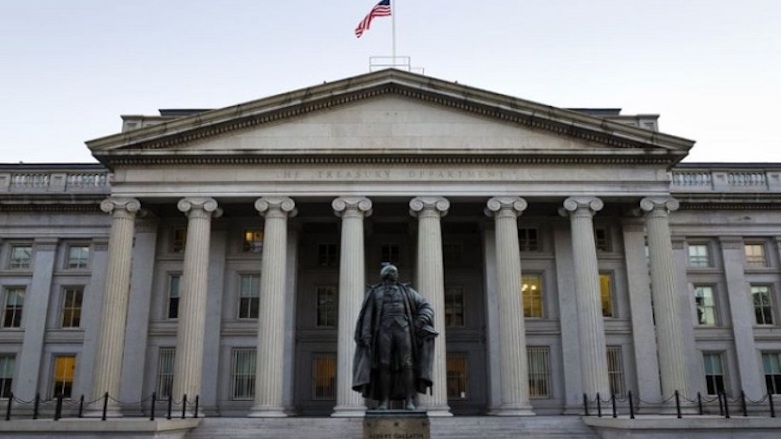US, Gulf Arabs impose sanctions on ISIS financiers

WASHINGTON DC (Kurdistan 24) – The Terrorist Financing Targeting Center (TFTC) designated six targets for their association with the so-called Islamic State of Iraq and Syria (ISIS), the US announced on Wednesday.
The TFTC, which was established in 2017, consists of the US plus the six Gulf Arab states: Saudi Arabia, Kuwait, Bahrain, Oman, Qatar, and the United Arab Emirates (UAE.)
Four designations relate to entities or individuals in Turkey and Syria, while two involve Afghanistan, where an ISIS “province,” known as ISIS-Khorasan (ISIS-K) was proclaimed in early 2015 after ISIS overran nearly one-third of Iraq in the summer of 2014 and proclaimed its caliphate.
Turkey and Syria
The three sanctioned entities in Turkey and Syria are money service businesses: Al Haram Foreign Exchange Co, Al-Khalidi Exchange, and the Tawasul Company.
All three had already been designated by the US, but Wednesday’s action brings in the Gulf Arab states to enforce sanctions as well.
Al-Khalidi Exchange is primarily based in Turkey – where it has 18 offices – in addition to branches in Syrian territory once held by ISIS and in Erbil.
Officials in the Kurdistan Region, which is at war with ISIS, regularly cooperate with US authorities in targeting ISIS elements when their activity becomes known.
Read More: US-led Coalition confirms IS funding network arrests in Erbil and Baghdad
As the Treasury Department explained, “Al-Khalidi was the most important financial transfer office in the region used to move money to fund ISIS-held areas” and the “largest financial exchange office that dealt with ISIS.”
“Hundreds of thousands of dollars per day passed through [Al-Khalidi’s] office in Sanliurfa, Turkey,” Treasury stated, emphasizing the large sums of money that ISIS commanded.
The second designated financial company – Al Haram Foreign Exchange – is also based primarily in Turkey, where it has 19 offices, in addition to branches elsewhere in the Middle East.
In April 2019, “ISIS members in Syria received instruction to conduct all financial transactions with Al Haram Exchange,” the Treasury Department said.
The third financial entity designated on Wednesday was the Tawasul Company, located in Harim, Syria, in Idlib province.
A Syrian national, based in Istanbul – Abd al-Rahman Ali Husayn al-Ahmad al-Rawi – was also cited in Wednesday’s TFTC decision.
Al-Rawi is part of “the al-Rawi network,” a group consisting primarily of Iraqis, whose origins go back to the 1990s when it was engaged in smuggling and sanctions-busting on behalf of Saddam Hussein’s regime.
Read More: US sanctions Saddam-era network supporting ISIS
According to the Treasury Department, Abdul Rahman al-Rawi and a Syrian-based hawaldar had a “secret partnership with two Syria-based Iraqi brothers to facilitate financial transfers into Syria on behalf of ISIS via hawala networks.”
The two men conducted a significant amount of legitimate business, but they also secretly moved money for ISIS.
Al-Rawi had a “hard-currency liquidity of several million dollars in Syria” and “served as ISIS’s general financial manager,” the Treasury Department explained. He was also “responsible for external ISIS money transfers originating from and destined to foreign countries.”
The US first announced several of these designations in November, along with other Turkish-based companies and individuals supporting ISIS financially, which prompted the Voice of America (VOA) to remark on Turkey’s possible role.
“Experts say the US sanctions raise questions about the Turkish government’s handling of ISIS networks inside Turkey,” the VOA said. “Turkish authorities reportedly have increased their crackdown on ISIS networks on Turkish soil, but some experts believe significant parts of the terror group’s financial structure continue to operate in the country.”
Afghanistan
Wednesday’s action also targeted an Afghan charity which raised money for ISIS-Khorasan.
The Nejaat Social Welfare Organization “was used as a cover company to facilitate the transfer of funds and support the activities of ISIS-K,” the Treasury Department explained.
The organization “collected donations on behalf of ISIS-K from individuals in Qatar, the United Arab Emirates, Iraq, and other Middle Eastern countries,” it said.
“Money was then transferred from the Gulf to Asia – via the banking system – where an ISIS-K coordinator would collect the transferred funds.” The supposed charity had offices in Kabul and Jalalabad, which “distributed the funds to ISIS-K commanders.”
A 50-year-old Afghan, Sayed Habib Ahmed Khan, a resident of Kuwait, was named as the director of the organization, and he was sanctioned as well.
Editing by Karzan Sulaivany
